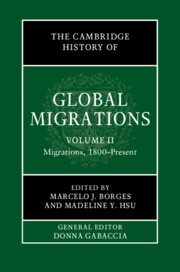Book contents
- The Cambridge History of Global Migrations
- The Cambridge History of Global Migrations
- The Cambridge History of Global Migrations
- Copyright page
- Contents
- Figures
- Maps
- Tables
- General Editor Acknowledgments
- Volume 2 Acknowledgments
- Notes on Contributors to Volume 2
- General Introduction
- Introduction to Volume 2
- 1 Multiscalar Approaches and Transcultural Societal Studies
- Part I Problematizing Freedom and Mobility
- Part II Empires, New Nations, and Mobilities
- 5 Pacific Islander Mobilities from Colonial Incursions to the Present
- 6 Japanese Imperial Migrations
- 7 Immigration Restriction in the Anglo-American Settler World, 1830s–1930s
- 8 Europe’s Postcolonial Migrations since 1945
- Part III Specialized Migrations and Commercial Diasporas
- Part IV Circulations of Laborers
- Part V Transnational Politics and International Solidarities
- Part VI Displaced Peoples and Refugees
- Part VII Migrant Communities, Cultures, and Networks
- Part VIII Migration Control, Discipline, and Regulation
- Part IX Technologies of Migration and Communication
- Index to Volume 2
- References
8 - Europe’s Postcolonial Migrations since 1945
from Part II - Empires, New Nations, and Mobilities
Published online by Cambridge University Press: 12 May 2023
- The Cambridge History of Global Migrations
- The Cambridge History of Global Migrations
- The Cambridge History of Global Migrations
- Copyright page
- Contents
- Figures
- Maps
- Tables
- General Editor Acknowledgments
- Volume 2 Acknowledgments
- Notes on Contributors to Volume 2
- General Introduction
- Introduction to Volume 2
- 1 Multiscalar Approaches and Transcultural Societal Studies
- Part I Problematizing Freedom and Mobility
- Part II Empires, New Nations, and Mobilities
- 5 Pacific Islander Mobilities from Colonial Incursions to the Present
- 6 Japanese Imperial Migrations
- 7 Immigration Restriction in the Anglo-American Settler World, 1830s–1930s
- 8 Europe’s Postcolonial Migrations since 1945
- Part III Specialized Migrations and Commercial Diasporas
- Part IV Circulations of Laborers
- Part V Transnational Politics and International Solidarities
- Part VI Displaced Peoples and Refugees
- Part VII Migrant Communities, Cultures, and Networks
- Part VIII Migration Control, Discipline, and Regulation
- Part IX Technologies of Migration and Communication
- Index to Volume 2
- References
Summary
Volume 2 of The Cambridge History of Global Migrations presents an authoritative overview of the various continuities and changes in migration and globalization from the 1800s to the present day. Despite revolutionary changes in communication technologies, the growing accessibility of long-distance travel, and globalization across major economies, the rise of nation-states empowered immigration regulation and bureaucratic capacities for enforcement that curtailed migration. One major theme worldwide across the post-1800 centuries was the differentiation between “skilled” and “unskilled” workers, often considered through a racialized lens; it emerged as the primary divide between greater rights of immigration and citizenship for the former, and confinement to temporary or unauthorized migrant status for the latter. Through thirty-one chapters, this volume further evaluates the long global history of migration; and it shows that despite the increased disciplinary systems, the primacy of migration remains and continues to shape political, economic, and social landscapes around the world.
Keywords
- Type
- Chapter
- Information
- The Cambridge History of Global Migrations , pp. 180 - 198Publisher: Cambridge University PressPrint publication year: 2023

